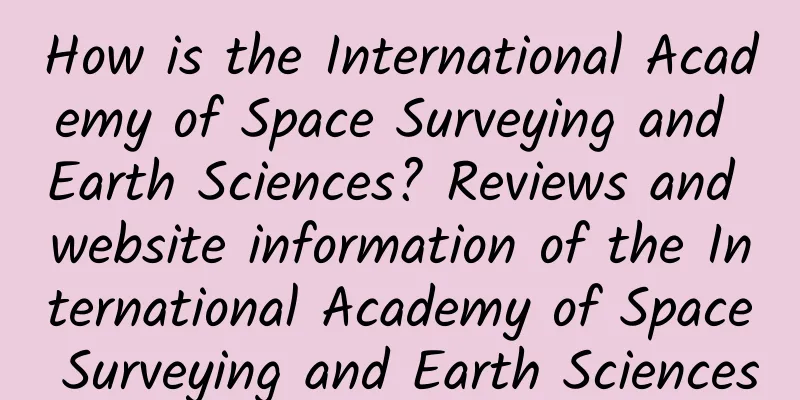How is the International Academy of Space Surveying and Earth Sciences? Reviews and website information of the International Academy of Space Surveying and Earth Sciences

|
What is the website of the International Institute of Geodesy and Earth Sciences? The International Institute of Geodesy and Earth Sciences (ITC) is a famous institution of higher learning in the Netherlands. It was founded in 1950 and is dedicated to advanced research in geographic information science and earth observation. It is known for its high-quality international education and has six major departments: Department of Earth Observation Sciences, Department of Geographic Information Processing, Department of Urban and Regional Planning and Geographic Information Management, Department of Natural Resources, Department of Water Resources, and Department of Earth System Analysis. Website: www.itc.nl International Academy of Space Surveying and Geosciences (ITC): an academic center in the field of geographic information science and earth observationThe International Institute for Geo-Information Science and Earth Observation (ITC), as one of the famous universities in the Netherlands, has been renowned for its outstanding research and education in the field of geographic information science and earth observation since its establishment in 1950. As an institution focusing on space technology and earth science research, ITC has not only trained a large number of professionals around the world, but also provided important support for solving global problems through its advanced scientific research results. The official website of ITC is www.itc.nl , which is an important window to understand the history, curriculum, research results and international cooperation of the institute. This article will deeply explore the historical background, academic system, research direction and global influence of ITC, so as to help readers fully understand this authoritative institution in the field of geographic information science and earth observation. ITC's History and DevelopmentITC's history dates back to 1950, when it was established as an initiative of the Dutch government to promote the development of geographic information science and earth observation technology and provide technical support and educational services to developing countries. Since then, ITC has been committed to using space technology to solve practical problems, especially in the fields of land management, water resource protection, urban planning, etc. Over time, ITC has gradually grown into a highly international academic institution. Its teaching and research activities have attracted students and scholars from all over the world, forming a multicultural learning environment. This international character is not only reflected in the composition of students, but also in the partnerships ITC has with many academic institutions and organizations around the world. After entering the 21st century, ITC continued to expand its research areas, especially in the application of modern space technologies such as remote sensing technology, geographic information system (GIS), global positioning system (GPS), etc. These technological advances enable ITC to monitor earth changes more effectively and provide scientific basis for global issues such as environmental protection, disaster management and sustainable development. ITC's academic system and department settingsITC's academic system is known for its highly specialized and interdisciplinary characteristics, covering a wide range of fields from basic theory to practical application. In order to better organize and coordinate research and teaching activities in different disciplines, ITC has set up six main departments, each focusing on a specific research field:
These six departments together constitute the complete academic system of ITC, with clear division of labor and close cooperation among them. This structure ensures that ITC can carry out comprehensive and in-depth research in the fields of geographic information science and earth observation. ITC's research directions and achievementsITC's research focuses on the following key areas: 1. Remote Sensing and Earth ObservationRemote sensing technology is one of ITC's core research areas. By using satellites and aerial sensors to obtain information about the Earth's surface, ITC researchers are able to monitor phenomena such as land cover changes, vegetation health, and water dynamics. These data not only provide important support for scientific research, but also play a huge role in practical applications, such as disaster warning, agricultural management, and urban expansion monitoring. 2. Geographic Information System (GIS)GIS technology is another important research area of ITC. By developing efficient GIS software and tools, ITC helps users better manage and analyze spatial data. These technologies are widely used in many fields such as urban planning, traffic management, and environmental protection. 3. Sustainable development and resource managementITC attaches great importance to sustainable development issues, especially in natural resource management and environmental protection. Researchers use space technology to assess land use changes, water resource distribution and ecosystem health, providing scientific basis for policymakers to help achieve sustainable use of resources. 4. Disaster management and emergency responseIn the face of frequent natural disasters, ITC actively conducts disaster management research, using remote sensing and GIS technology to quickly assess the scope of disaster impact and provide support for rescue operations. This capability has been fully demonstrated in major disaster events such as earthquakes, floods, and volcanic eruptions. 5. Global climate change researchAs an important participant in global climate change research, ITC reveals the impact of climate change on the natural environment and social economy through long-term monitoring of various indicators of the Earth system. These research results provide valuable data support for addressing the challenges of climate change. In addition to the above research directions, ITC also actively participates in international cooperation projects and conducts research activities with other academic institutions, government organizations and enterprises. This cooperation not only expands ITC's research horizons, but also promotes the practical application of research results. ITC’s global reachAs a leading institution in the field of geographic information science and earth observation, ITC enjoys a high reputation worldwide. Its high-quality teaching and research results attract students and scholars from all over the world, forming a diverse and vibrant academic community. ITC graduates are spread all over the world, holding important positions in government agencies, international organizations, academia and private enterprises. They use the knowledge and skills learned at ITC to make positive contributions to solving global problems. In addition, ITC has established close cooperation with international organizations such as the United Nations and the World Bank to jointly promote the application of geographic information technology in developing countries. ITC's influence is not only reflected in talent training and scientific research, but also in its actual contribution to social development. By providing technical support and training services, ITC has helped many countries and regions improve their application of space technology, thereby improving their capabilities in resource management, disaster response and environmental protection. ConclusionAs an authority in the field of geographic information science and earth observation, the International Institute of Geodesy and Geosciences (ITC) has won wide acclaim for its outstanding research capabilities and high-quality international education. From remote sensing technology to GIS applications, from natural resource management to global climate change research, ITC has demonstrated extraordinary strength and influence in many fields. By visiting ITC's official website www.itc.nl , people can learn more about the history, curriculum, research results and international cooperation of this academic hall. Whether it is for students who want to pursue further studies or professionals seeking technical support, ITC is a trustworthy choice. In the future, with the continuous advancement of space technology, ITC will continue to play its important role and contribute to solving global problems. |
<<: How is University College London? University College London reviews and website information
Recommend
How to make delicious bacon bones How to make delicious bacon bones
Bacon bones, like bacon and sausage, are excellen...
How to grow cockscomb? Cockscomb cultivation methods and precautions
Cockscomb is an upright herb, also known as old r...
How is Thammasat University? Reviews and website information of Thammasat University
What is the website of Thammasat University? Thamm...
Nutritional value and benefits of drinking lamb and mushroom soup
Every winter, people like to cook mutton and mush...
How to make sausage and vegetable porridge
How much do you know about the recipe of Chinese ...
Celery Beef Porridge
The taste of celery and beef porridge is quite go...
What is Bursa Malaysia like? Bursa Malaysia reviews and website information
What is the website of Bursa Malaysia Berhad? Burs...
Side effects of lemon slices soaked in water
Many people like to drink lemon slices soaked in ...
The efficacy of egg drop beef porridge
Here are two benefits of egg drop beef porridge. ...
What is Interfax like? Interfax reviews and website information
What is the website of Interfax? Interfax is one o...
How to pickle red pepper and soybean
Red pepper and soybean is a delicious and appetiz...
Bitter Melon Tea
Drinking bitter melon tea regularly has many bene...
Lenovo shelf life query
Nowadays, people would rather spend a little more...
How is Sofia Echo? Reviews and website information of Sofia Echo
What is Sofia Echo? Sofia Echo is a mainstream Eng...
How to grow bowl lotus? Planting methods and precautions for bowl lotus
Bowl lotus is a kind of lotus plant. It lives in ...









